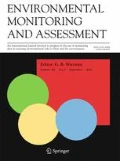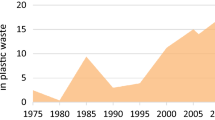Abstract
This paper analyzes the generation and composition of municipal solid waste in Spanish towns and cities with more than 5000 inhabitants, which altogether account for 87 % of the Spanish population. To do so, the total composition and generation of municipal solid waste fractions were obtained from 135 towns and cities. Homogeneity tests revealed heterogeneity in the proportions of municipal solid waste fractions from one city to another. Statistical analyses identified significant differences in the generation of glass in cities of different sizes and in the generation of all fractions depending on the hydrographic area. Finally, linear regression models and residuals analysis were applied to analyze the effect of different demographic, geographic, and socioeconomic variables on the generation of waste fractions. The conclusions show that more densely populated towns, a hydrographic area, and cities with over 50,000 inhabitants have higher waste generation rates, while certain socioeconomic variables (people/car) decrease that generation. Other socioeconomic variables (foreigners and unemployment) show a positive and null influence on that waste generation, respectively.




Similar content being viewed by others
References
Abu-Qdais, H., Hamoda, M., & Newham, J. (1997). Analysis of residential solid waste at generation sites. Waste Management & Research, 15, 395–406.
Akaike, H. (1974). A new look at the statistical model identification. IEE Transactions on Automatic Control, 19, 716–723.
ASPAPEL (2011). Opportunities for promoting recycling society in environments of universities and other teaching spaces: the case of the recovery and recycling of paper. http://www.magrama.gob.es/imagenes/es/Informe universidades MMARM-ASPAPEL tcm7-189308.pdf. Accessed May 2013.
Bach, H., Mild, A., Natter, M., & Weber, A. (2004). Combining sociodemographic and logistic factors to explain the generation and collection of waste paper. Resources, Conservation and Recycling, 41, 65–73.
Bandara, N., Hettiaratchi, J., Wirasinghe, S., & Pilapiiya, S. (2007). Relation of waste generation and composition to socio-economic factors: a case study. Environmental Monitoring and Assessment, 135, 31–39.
Beigl, P., Wassermann, G., Schneider, F., Salhofer, S. (2004). Forecasting municipal solid waste generation in major European cities. http://www.iemss.org/iemss2004/pdf/regional/beigfore.pdf. Accessed March 2008.
Burnhan, K., Anderson, D. (2002). Model selection and multimodel inference: a practical information-theoretic approach. 2nd ed., Springer-Verlag.
Daskalopoulos, E., Badr, O., & Probert, S. (1998). Municipal solid waste: a prediction methodology for the generation rate and composition in the European Union countries and the United States of America. Resources, Conservation and Recycling, 24, 155–166.
Draper, N., & Smith, H. (1981). Applied regression analysis (2nd ed.). New York: John Wiley and Sons, Inc.
Emery, A., Griffiths, A., & Williams, K. (2003). In a depth study of the effects of socio-economic conditions on household waste recycling practices. Waste Management & Research, 21, 180–190.
Fortuny, M., Soler, R., Cánovas, C., & Sánchez, A. (2008). Technical approach for a sustainable tourism development. Case study in the Balearic Islands. Journal of Cleaner Production, 16, 860–869.
Gallardo, A., Bovea, M., Colomer, F., Prades, M., & Carlos, M. (2010). Comparison of different collection systems for sorted household waste in Spain. Waste Management, 30, 379–406.
Gallardo, A., Bovea, M., Colomer, F., & Prades, M. (2012). Analysis of collection systems for sorted household waste in Spain. Waste Management, 32, 1623–1633.
Hockett, D., Lober, D., & Pilgrim, K. (1995). Determinants of per capita municipal solid waste generation in the southeastern United States. Journal of Environmental Management, 45, 205–217.
IET (2008). Balance del turismo. Resultados de la actividad turstica en España. Technical Report. Instituto de Estudios Turísticos.
INE (2008a). Demografía y población. Cifras de población y censos demográficos. http://www.ine.es. Accessed April 2011.
INE (2008b). Sociedad. Análisis sociales. http://www.ine.es. Accessed April 2011.
Jofra, M., Font, D., Mestre, M. (2011a). Study on waste management models in islands http://www.magrama.gob.es/imagenes/es/Estudio sobre modelos de gestión de residuos en entornos insulares tcm7-183310.pdf. Accessed May 2013.
Jofra, M., Citlalic, A., Calaf, M. (2011b). Study on waste management models in isolated rural areas. http://www.magrama.gob.es/imagenes/es/Gestion de residuos en entornos rurales vfinal revisada 150411 tcm7-183008.pdf. Accessed May 2013.
Lebersorger, S., & Beigl, P. (2011). Municipal solid waste generation in municipalities: quantifying impacts of household structure, commercial waste and domestic fuel. Waste Management, 31, 1907–1915.
Ojeda, S., Lozano-Olvera, G., Adalberto, R., & Armijo, C. (2008). Mathematical modeling to predict residential solid waste generation. Waste Management, 28, S7–S13.
R Development Core Team (2012). R: a language and environment for statistical computing. R Foundation for Statistical Computing. Vienna, Austria. URL: http://www.R-project.org. ISBN 3-900051-07-0. Accessed March 2012.
Thanh, N., Matsui, Y., & Fujiwara, T. (2010). Household solid waste generation and characteristic in Mekong Delta city, Vietnam. Journal of Environmental Management, 91, 2307–2321.
UNTWO. (2010). World’s top tourism destinations. World Top Barometer, 8, 9–10.
Acknowledgments
Firstly, we would like to thank all the town councils that so willingly provided us with their data, since without their collaboration it would not have been possible to conduct this study. Secondly, we are grateful to the Spanish Ministry of the Environment and Rural and Marine Affairs for funding the projects Study of the different models of selective collection of RSU implemented in Spain, Determination of evaluation indicators (Estudio de los diferentes modelos de recogida selectiva de RSU implantados en España, Determinación de indicadores de evaluación) (Number 279/2006/2-2.1) and Study of the different models of selective collection of RSU implemented in Spain, Determination of evaluation indicators, Second phase (Estudio de los diferentes modelos de recogida selectiva de RSU implantados en España, Determinación de indicadores de evaluación. Fase segunda) (Number AA228/2007/1-02.1), and Designing a model for the management of the municipal waste collection in Spanish populations (Diseño de un modelo para la gestión de la recogida de residuos urbanos en las poblaciones españolas) and to the University Jaume I, by the UJI project P11A2011-11.
Author information
Authors and Affiliations
Corresponding author
Rights and permissions
About this article
Cite this article
Prades, M., Gallardo, A. & Ibàñez, M.V. Factors determining waste generation in Spanish towns and cities. Environ Monit Assess 187, 4098 (2015). https://doi.org/10.1007/s10661-014-4098-6
Received:
Accepted:
Published:
DOI: https://doi.org/10.1007/s10661-014-4098-6




